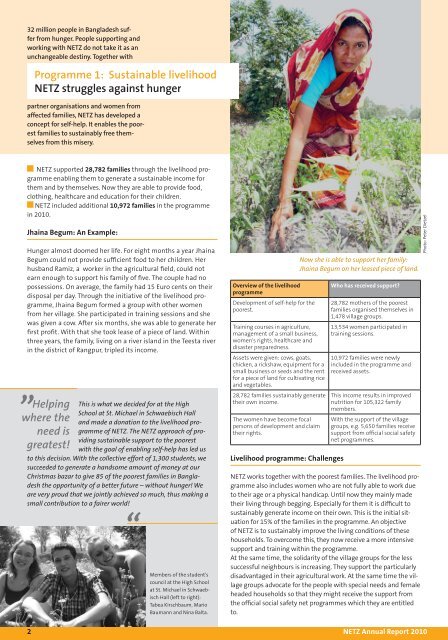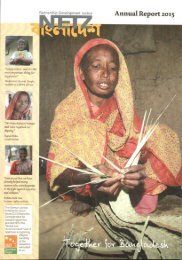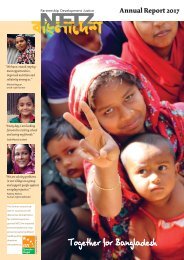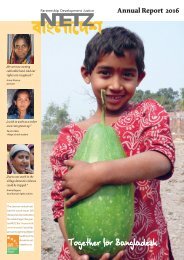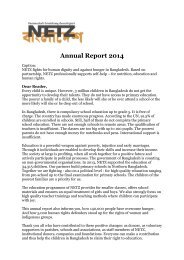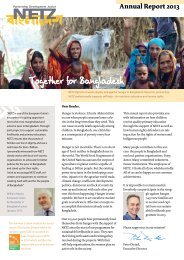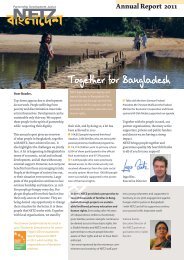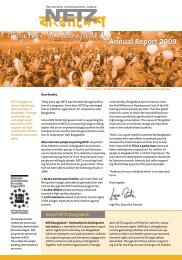NETZ Bangladesch Annual Report 2010
You also want an ePaper? Increase the reach of your titles
YUMPU automatically turns print PDFs into web optimized ePapers that Google loves.
32 million people in Bangladesh suffer<br />
from hunger. People supporting and<br />
working with <strong>NETZ</strong> do not take it as an<br />
unchangeable destiny. Together with<br />
Programme 1: Sustainable livelihood<br />
<strong>NETZ</strong> struggles against hunger<br />
partner organisations and women from<br />
affected families, <strong>NETZ</strong> has developed a<br />
concept for self-help. It enables the poorest<br />
families to sustainably free themselves<br />
from this misery.<br />
<strong>NETZ</strong> supported 28,782 families through the livelihood programme<br />
enabling them to generate a sustainable income for<br />
them and by themselves. Now they are able to provide food,<br />
clothing, healthcare and education for their children.<br />
<strong>NETZ</strong> included additional 10,972 families in the programme<br />
in <strong>2010</strong>.<br />
Jhaina Begum: An Example:<br />
Hunger almost doomed her life. For eight months a year Jhaina<br />
Begum could not provide sufficient food to her children. Her<br />
husband Ramiz, a worker in the agricultural field, could not<br />
earn enough to support his family of five. The couple had no<br />
possessions. On average, the family had 15 Euro cents on their<br />
disposal per day. Through the initiative of the livelihood programme,<br />
Jhaina Begum formed a group with other women<br />
from her village. She participated in training sessions and she<br />
was given a cow. After six months, she was able to generate her<br />
first profit. With that she took lease of a piece of land. Within<br />
three years, the family, living on a river island in the Teesta river<br />
in the district of Rangpur, tripled its income.<br />
Helping<br />
where the<br />
need is<br />
greatest!<br />
This is what we decided for at the High<br />
School at St. Michael in Schwaebisch Hall<br />
and made a donation to the livelihood programme<br />
of <strong>NETZ</strong>. The <strong>NETZ</strong> approach of providing<br />
sustainable support to the poorest<br />
with the goal of enabling self-help has led us<br />
to this decision. With the collective effort of 1,300 students, we<br />
succeeded to generate a handsome amount of money at our<br />
Christmas bazar to give 85 of the poorest families in Bangladesh<br />
the opportunity of a better future – without hunger! We<br />
are very proud that we jointly achieved so much, thus making a<br />
small contribution to a fairer world!<br />
Members of the student‘s<br />
council at the High School<br />
at St. Michael in Schwaebisch<br />
Hall (left to right):<br />
Tabea Kirschbaum, Mario<br />
Baumann and Nina Balta.<br />
Overview of the livelihood<br />
programme<br />
Development of self-help for the<br />
poorest.<br />
Training courses in agriculture,<br />
management of a small business,<br />
women‘s rights, healthcare and<br />
disaster preparedness.<br />
Assets were given: cows, goats,<br />
chicken, a rickshaw, equipment for a<br />
small business or seeds and the rent<br />
for a piece of land for cultivating rice<br />
and vegetables.<br />
28,782 families sustainably generate<br />
their own income.<br />
The women have become focal<br />
persons of development and claim<br />
their rights.<br />
Livelihood programme: Challenges<br />
Now she is able to support her family:<br />
Jhaina Begum on her leased piece of land.<br />
Who has received support?<br />
28,782 mothers of the poorest<br />
families organised themselves in<br />
1,478 village groups.<br />
13,534 women participated in<br />
training sessions.<br />
10,972 families were newly<br />
included in the programme and<br />
received assets.<br />
This income results in improved<br />
nutrition for 105,322 family<br />
members.<br />
With the support of the village<br />
groups, e.g. 5,650 families receive<br />
support from official social safety<br />
net programmes.<br />
<strong>NETZ</strong> works together with the poorest families. The livelihood programme<br />
also includes women who are not fully able to work due<br />
to their age or a physical handicap. Until now they mainly made<br />
their living through begging. Especially for them it is difficult to<br />
sustainably generate income on their own. This is the initial situation<br />
for 15% of the families in the programme. An objective<br />
of <strong>NETZ</strong> is to sustainably improve the living conditions of these<br />
households. To overcome this, they now receive a more intensive<br />
support and training within the programme.<br />
At the same time, the solidarity of the village groups for the less<br />
successful neighbours is increasing. They support the particularly<br />
disadvantaged in their agricultural work. At the same time the village<br />
groups advocate for the people with special needs and female<br />
headed households so that they might receive the support from<br />
the official social safety net programmes which they are entitled<br />
to.<br />
Photo: Peter Dietzel<br />
2 <strong>NETZ</strong> <strong>Annual</strong> <strong>Report</strong> <strong>2010</strong>


